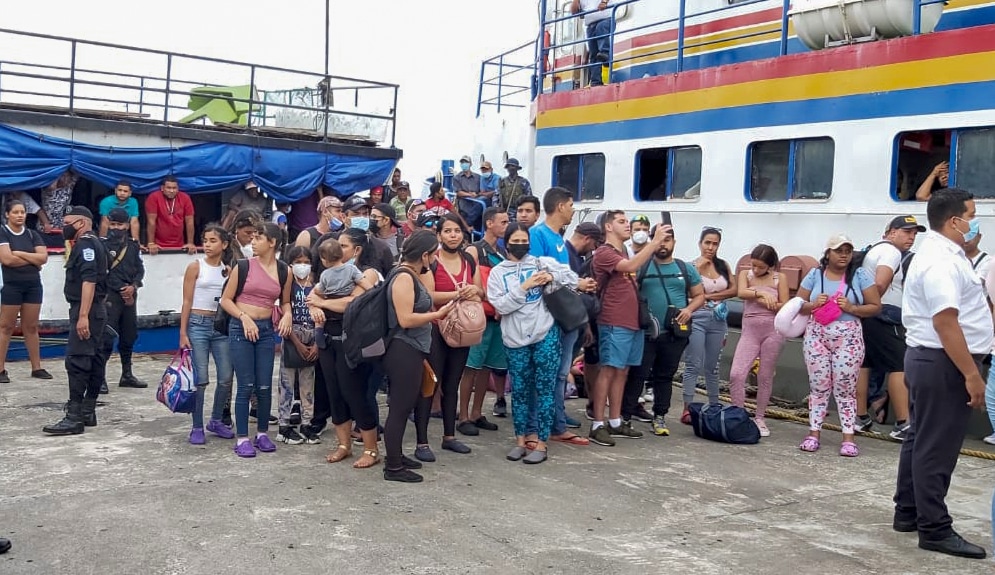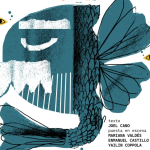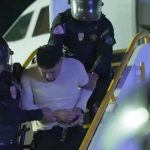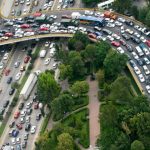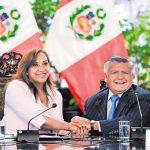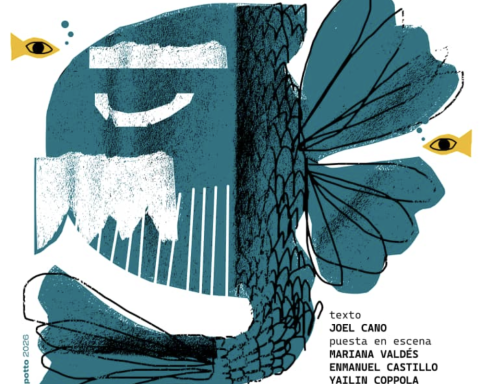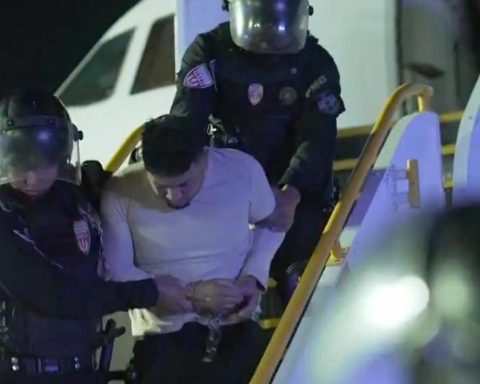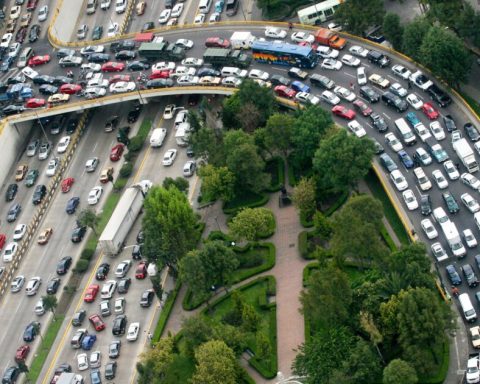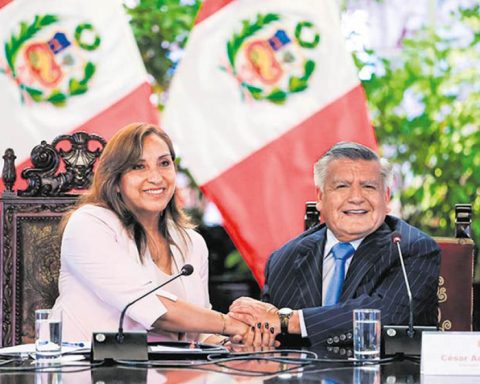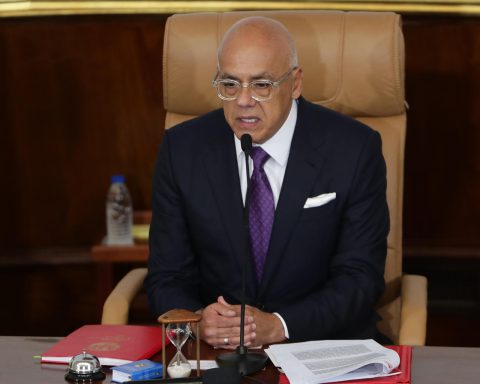A group of 118 Venezuelan migrants were “robbed” in Nicaragua by Immigration officials, who demanded 150 dollars for a safe-conduct that they were not given, and part of them were also locked up, stripped naked and searched to take the money, according to what they reported to CONFIDENTIAL.
The group traveled by sea from the island of San Andrés, jurisdiction of Colombia, to Corn Island, in the Autonomous Region of the South Caribbean Coast (RACCS), and arrived in Bluefields on August 4, with the aim of crossing the country en route to the United States.
The Venezuelan Luis Alfredo González is one of the migrants who arrived in that group, and he denounced what happened to CONFIDENTIAL. He recounted that he arrived in Corn Island around 2:00 am and stayed at the Sweet Dreams Hotel, located next to the pier, and hours later he boarded a ferry that took him to Bluefields.
“Some drug traffickers, who also traffic people, coyotes who help you cross the sea, were the ones who crossed us and took us to that hotel, with which they apparently had a relationship, because they tied everything up. We slept a little in that place and hours later, the same day, we left on the ferry to Bluefields”, he detailed. On the boat, the group of Venezuelan migrants was approached by immigration officials, who asked for their passports and wrote them down on a list.
“When we arrived at Bluefields, it was like in the afternoon, another group of Immigration officials was already waiting for us there. They put us on a bus, they took us to a fire station (a station), it was not for Immigration, and they kept us there for several hours, ”he described.
“In Nicaragua the authorities robbed us”
The Venezuelan migrant affirms that at the Bluefields fire station – after taking away their passports – the Immigration officials told them that they had to pay 150 dollars for a safe-conduct, which supposedly would allow them to travel through Nicaraguan territory without any problem.
“There were people who had money and paid it, but others, like me, didn’t have that much money and we couldn’t pay them, because they left us with nothing to go on to the United States. Then, since we said that we did not have that amount, they asked us how far we had gone. In my case, I offered 20 dollars and they took it from me, but then they put us in a dark room and stripped us naked one by one to find the money and take the 150 dollars from us, ”she denounced.
González considers that the actions of the officials were “corrupt and illegal.” It was “a robbery, they forced that money away from us, they robbed us, and the worst thing is that they take it away from us and they don’t give us any safe-conduct paper. They told us that, if they stopped us later, that we should only say that we passed by and that the Police would already know that we had already paid for that.”
“I had 170 dollars for the trip and from the heart I gave them 20, calculating that I would have left over for the trip, but when they stripped me they found the other 150 dollars I had to continue, so they gave me back the 20 and took the 150 from me. ”, he denounced.
González was traveling with 14 other Venezuelans who, like him, had eight days to cross at the time. He stressed that in all that time –since they left Venezuela, fleeing the sociopolitical and economic crisis that their country is experiencing– they were “moved by people who trafficked drugs, coyotes, and they did not rob us, but in Nicaragua the authorities robbed us, They are the ones who are supposed to take care of the civilian,” he claimed.
Threatened with prison for claiming “the robbery”
González assures that, after the “robbery”, they insisted that they be given “a paper sealed by Immigration” and the response of the authorities was “threats of imprisonment”.
“We complained, we told them that in all the countries they gave a paper stamped by Immigration as a safe conduct, but they did not give it, they took a long time, they were very mysterious and another corrupt, one of the policemen who was with them, who supported the robbery , wanted to put me in jail because I claimed them, “he said.
He narrated that several of the group also advocated that they not take their money because “they had to eat, pay the tickets and they did not care about that, they only cared about taking the money. They are corrupt, so much sacrifice that one made to leave Venezuela and that the same officials still come to rob him is outrageous.
On August 5, at around 1 a.m., Nicaraguan Immigration officials allowed the group to leave the Bluefields fire station. González assures that they were “abandoned to their fate, in a dark street, that they could have finished stealing the little they left us or the cell phones, but they did not mind leaving us abandoned, we had to walk from the fire department to the Bluefields bus terminal to continue advancing”.
The group left Nicaragua irregularly for fear that the official Immigration posts would ask them for the safe conduct that the officials of that institution in Bluefields never gave them.
“We had to ask our relatives to send us some money to continue on the road. We left through a blind spot because we were afraid that they would stop us again and we would not have that paper, because they took so much money from us and we couldn’t even pass legally because they didn’t even give us a paper,” González claimed.
Another group of Venezuelans arrived in Bluefields
On August 7, while González was already transiting through Honduran territory, with a safe-conduct valid for five days, which they gave him free of charge at Honduran Migration, another group of Venezuelans arrived on the South Caribbean coast of Nicaragua.
Local media reported that 185 migrants: 178 Venezuelans, three Colombians, three Peruvians and one Romanian, arrived in Bluefields after being on Corn Island, where they arrived from San Andrés Island.
The group of migrants was again intercepted by Immigration and Immigration in Bluefields. The report states that, just as they did with the 118 Venezuelans who arrived on August 4, they took their passports and then transferred them in minibuses to the fire station, where, supposedly, they would receive medical attention and their immigration status would be defined. .
Citizens who live near the Bluefields fire station assured CONFIDENTIAL that this area was heavily guarded by the Police, between August 7 and 8. But on August 9, “there was no longer a police presence, because they took the group out at one in the morning, as they did with the others who came on August 4.”
In the last two years, the migration of Venezuelans to the United States has increased again. United States Customs and Border Protection (CBPfor its acronym in English) reported that so far in fiscal year 2022 – from October 2021 to June 2022 – 112,212 “encounters or detentions” of Venezuelan migrants have been recorded.
In 2021, the encounters of Venezuelan migrants reached 50,499, while in 2020 – in the context of the start of the covid-19 pandemic – the CBP only registered 4,520.
Nicaragua is the route for the exodus of Venezuelan and Cuban migrants, who use the territory as a springboard to follow their path towards the “American dream.”
After the regime of Daniel Ortega decreed, in November 2021, free visas for Cubans, the arrival of these groups was more evident. Videos even went viral on social networks in which dozens of Cubans shouted: “We’re going to Nicaragua.”
The groups of Venezuelans who have transited through Nicaragua in search of reaching the United States have also suffered tragedies along the way. Last July 27, at least 13 migrants who came from Venezuela They died in a traffic accident on La Cucamonga hill, in Estelí.
The Nicaraguan authorities promised to contact the relatives and support the repatriation of the bodies. However, the Venezuelan Marisol Castellanos denounced that she is not allowed to verify the status of her granddaughter Adalyn Valeria, who survived the accident in which her parents died.
In information published by the newspaper La Prensa, Castellanos denounced that the Venezuelan authorities assure that the girl “is very well cared for and under medical control” at the Foundation for the Family of Migrant Children and Adolescents, in Managua. However, La Prensa explained, this institution is not known in Nicaragua nor is there any reference on the internet. She added that the Venezuelan Ministry of Foreign Affairs explained to her that they are processing her repatriation, but she does not know how long it will take.
